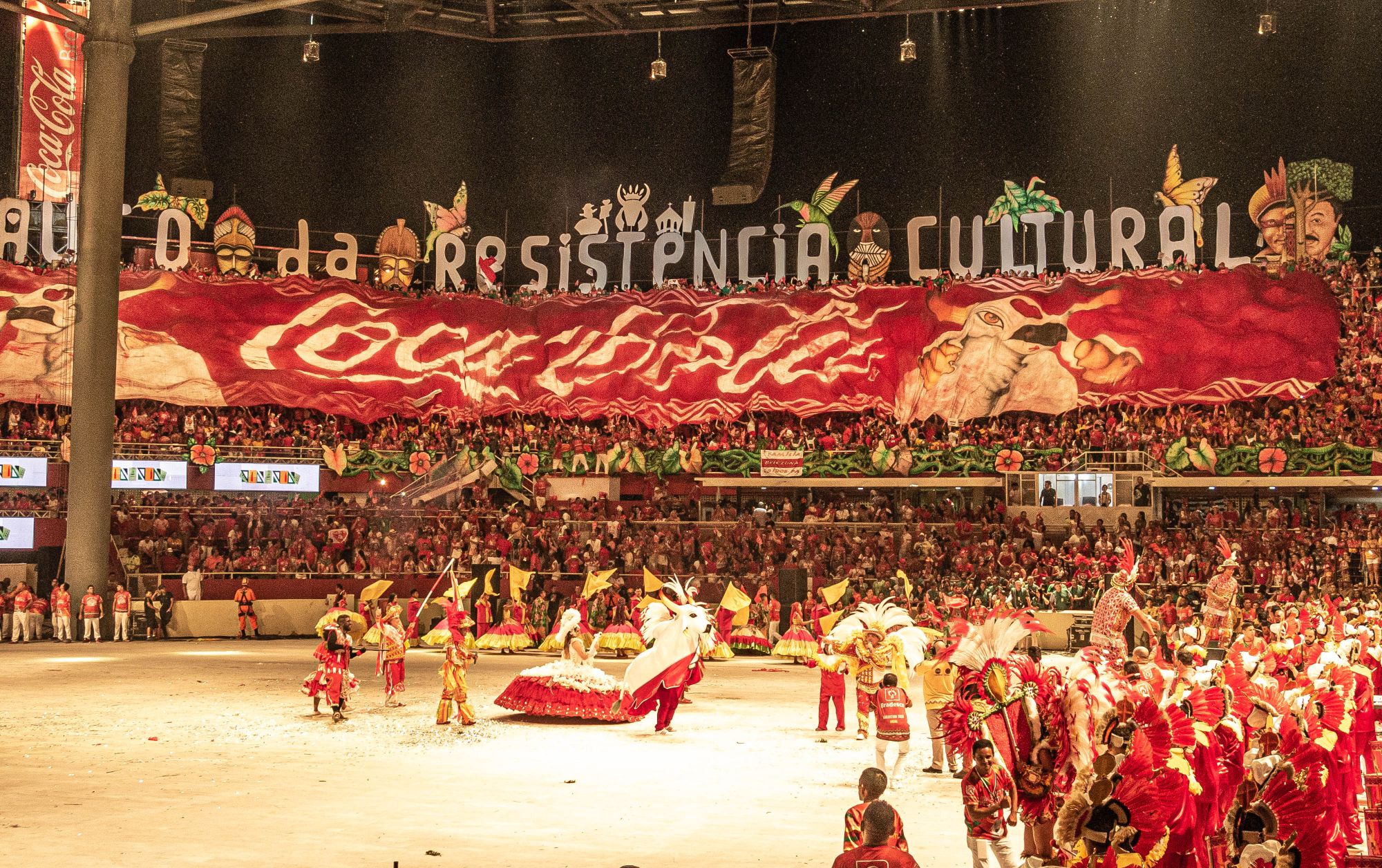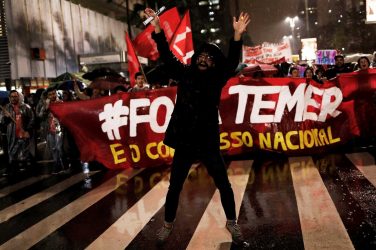There are no bridges or roads that connect the city-island of Parintins to the rest of the world. This remote city in the Amazon is 369 kilometers away from Manaus, the capital of Brazil’s Amazonas state. Parintins is home to thousands of low-income and Indigenous Brazilians and can only be reached by plane or boat. Its position along the Amazon River makes it dependent on commodities and resources that arrive from far away cities.
Despite these isolated conditions, the community of Parintins has developed a novel strategy that celebrates its folk and Indigenous traditions: the Festival do Boi-Bumbá (meaning “bull dance”). This annual event is the second most important festival in Brazil, after Rio de Janeiro’s globally renowned Carnaval.
Boi-Bumbá, which takes place at the end of June, fuels the local economy by attracting investment as well as thousands of visitors and artists. Over the years, the festival has become the city’s bridge from the deep Amazon to the outside world, reducing political and physical isolation while reinforcing its social capital and cultural assets.
Logistical, political and organizational challenges
Boi-Bumbá has a particular feature: a competition between two traditional teams, Garantido (in red) and Caprichoso (in blue). The teams compete during three nights of artistic performances in the Bumbódromo — a thirty-five-thousand-seat arena built specifically for the festival. The festival transforms the city into a colorful, loud and vibrant party.
During the festival, the city’s population almost doubles, creating major logistical challenges that range from providing water to transportation. Thousands of visitors arrive by boat and plane from Manaus and elsewhere. But Parintins’ hotel network has limited capacity. Tourists and vendors from various social classes mix up, sleeping on hammocks, boats, and residents’ homes that are temporarily transformed into hostels.
The organizational machine to support the event is set in motion months before the festival. An army of artists, sculptors, welders, painters and tailors work day and night inside galpões (large hangars) to create floats up to 25 meters high and to make the costumes that dancers, acrobats, singers, and musicians will wear during the shows.
For low-skilled workers, most often poorly paid owners of informal businesses, the festival remains an indispensable form of economic support. For everyone in the city, being part of the festival is a question of identity and belonging.
Overcoming the pandemic
The region was one of the hardest hit by the COVID-19 pandemic. Parintins introduced a curfew which limited work opportunities, especially for informal workers. Pandemic restrictions meant festivities were suspended for two years. During that time, poverty, joblessness, crime and other vulnerabilities worsened.
But the bumbás (the two teams) provided the infrastructure and network to get people the help they needed. Festival facilities were turned into help centers for the most vulnerable. Team members distributed hundreds of food baskets and provided support during the vaccination campaign.
Thanks to the organizers’ efforts, the festival was still able to go ahead virtually. The 2020 edition was put in place without live spectators and was transmitted on Brazilian TV. Something similar happened the year after: the “Live Parintins 2021” was followed by a large audience on TV and by more than 20,000 people live on YouTube. According to Jender Lobato, president of Caprichoso, it also generated approximately 10,000 tweets and reached more than three million people on social media.
With fans and enthusiasts watching the event online, buying souvenirs and making donations, the Boi-Bumbá found new ways to exist, contribute to the socioeconomic sustainability of the community, and keep Parintins on the political map of Brazil.
The return of the Boi-Bumbá
At the beginning of March 2022, the governor of the state of Amazonas, Wilson Lima, announced the return of the festival. Both the government and private investors increased their commitment to creating a “historic 55th edition.”
Streets were asphalted, the city museum was renovated, street art appeared on city walls and the Bumbódromo was given a facelift. Parintins’ festival has become a model for other cities and towns to emulate. A recent survey shows the existence of more than 120 bois-bumbás in 23 amazon cities.
Relying on tradition and cultural efforts has proven to be a successful way of overcoming isolation. The Boi-Bumbá does not solve all the challenges facing Parintins and the Amazon region. But it does bring enormous benefits in a territory characterized by marginalization, exclusion and a chronic lack of infrastructure. It is around the festival that Parintins and its residents are able to celebrate their traditions while building a shared vision of their own future.
Mauro Cossu is a PhD candidate and research assistant at the Faculty of Environmental Design, Université de Montréal
Gonzalo Lizarralde is a professeur titulaire – Faculté de l’aménagement, Université de Montréal
Lisa Bornstein is a professor at School of Urban Planning, McGill University
This article was originally published in The Conversation. Read the original article here: https://theconversation.com/parintins-a-remote-brazilian-city-overcoming-isolation-through-a-festival-191565













